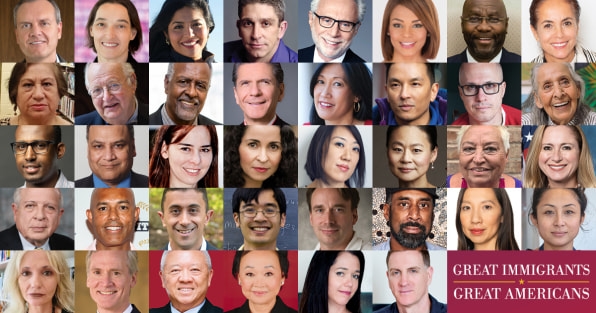In honor of Independence Day, the Carnegie Corporation of New York has inducted 38 new immigrants into its annals of amazing contributors to society. At the same time, the philanthropic funder continues to back grassroots efforts to mint more of them, by easing the process of immigration in the face of increasing government hostility to newcomers.
Since 2006, the Carnegie Corporation has highlighted the lives of so-called “Great Immigrants, Great Americans” in tribute to its namesake, the wealthy industrialist Andrew Carnegie. The former steel titan hailed from Scotland before literally reshaping America’s infrastructure. He believed that, in addition to just boosting the tax roll, people who become citizens often play an active and vital role in their communities. That’s proving true both socially and politically, and from a good business standpoint. This year’s list, for instance, includes the CEOs from Honeywell, Panda Restaurant Group, and the education and employment nonprofit Propel America.
Regardless of where you think this country is headed, many of Carnegie’s 2019 awardees trend toward boosting global unity, connectivity, and health. One example would be Gebisa Ejeta, a World Food Prize-winning geneticist originally from Ethiopia who developed a super resilient variety of sorghum that’s helping feed sub-Saharan Africa (an intervention that could contribute to more global stability). Another: Dina Katabi, a MacArthur Genius Grant recipient computer scientist from Syria who’s made great strides at increasing the “speed, reliability, and data security” of the internet. Then there’s Angelika Amon (Austria), an MIT cancer researcher who is pioneering new theories about cell division that might help cure the disease.

Carnegie just added a searchable archive of all 600-plus recipients, so you can search by country or year to choose your own inspiration.
But the goal is to expose the fact that many current immigrants who might eventually enter to these esteemed ranks are trapped in a bureaucratic nightmare.
In June, the federal government reportedly made the misleading claim that approvals for citizenship had reached a five-year high. Technically, that’s true. The roughly 757,000 Americans who became naturalized is up 16% from 2014. But that downplays the fact that the number of people who achieved citizenship did not improve at all from 2017. And it’s only “high” according to very recent history. The total acceptance rate is well below historical levels, despite a record backlog of applications. As New Americans Campaign researchers report, the Democrat-led House has approved $45 million to speed up processing times. In fiscal year 2017, the number of applications for citizenship increased by only 4% while the total number of applications awaiting processing more than doubled.
Since 2011, the Carnegie Corporation has given $13.5 million to the New Americans Campaign, part of the Immigrant Legal Resources Center, which has built a network that can encourage and expedite the path to citizenship for those eligible. The delay may play favorably to those supporting Trump’s isolationist agenda, but it’s also stopping people who might be qualified in directly opposing it.
“The numbers usually increase prior to a presidential election, since most people get excited about becoming citizens in order to vote,” says Geri Mannion, who is the program director of Carnegie’s U.S. Democracy and Special Opportunities Fund in an email to Fast Company. “Given backlogs of naturalization applications in some regions, it may not be possible for some applicants to get approved before the 2020 elections.”
In late May, the Government Accountability Office opened an investigation into the slow churn rate, which extends to other processes led by U.S. Citizenship and Immigrations Services like work visa issuances and green cards for temporary residency. All told, an estimated 2.3 million applications have gone unresolved. Melissa Rodgers, the director of the New Americans Campaign tells Fast Company in an email that NAC sites are seeing USCIS processing delays from 12 to 17 months on average, and sometimes up to two years.
In the meantime, Carnegie’s Great Immigrants roster continues to highlight the people who’ve made the best of a new opportunity—and represent the best in all of us.
(28)